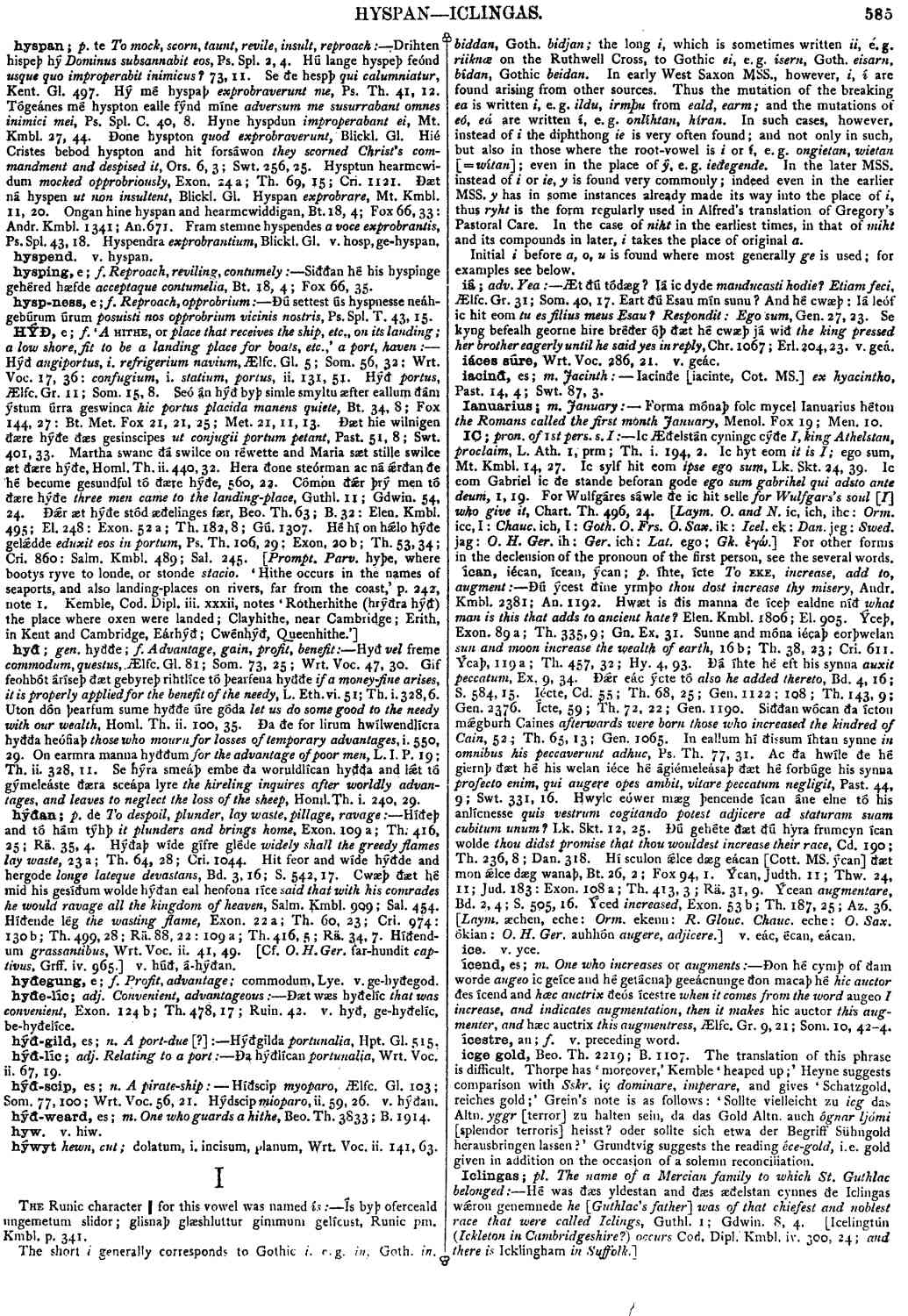ícan
- verb [ weak ]
-
Ðú ýcest ðine yrmþo
thou dost increase thy misery,
- Andr. Kmbl. 2381 ;
- An. 1192.
-
Hwæt is ðis manna ðe íceþ ealdne níð
what man is this that adds to ancient hate?
- Elen. Kmbl. 1806 ;
- El. 905.
-
Ýceþ,
- Exon. 89 a ;
- Th. 335, 9 ;
- Gn. Ex. 31 .
-
Sunne and móna iécaþ eorþwelan
sun and moon increase the wealth of earth,
- 16 b ;
- Th. 38, 23 ;
- Cri. 611 .
-
Ýcaþ,
- 119 a ;
- Th. 457,32 ;
- Hy 4, 93.
-
Ðá íhte he eft his synna
auxit peccatum,
- Ex, 9, 34.
-
Ðǽr eác ýcte tó
also he added thereto,
- Bd. 4, 16 ;
- S. 584, 15.
-
Iécte,
- Cd. 55 ;
- Th. 68, 25 ;
- Gen. 1122 ;
- 108 ;
- Th. 143, 9 ;
- Gen. 2376 .
-
Ícte,
- 59 ;
- Th. 72, 22 ;
- Gen. 1190 .
-
Siððan wócan ða ícton mǽgburh Caines
afterwards were born those who increased the kindred of Cain,
- 52 ;
- Th. 65, 13 ;
- Gen. 1065 .
-
In eallum hí ðissum íhtan synne
in omnibus his peccaverunt adhuc,
- Ps. Th. 77, 31.
-
Ac ða hwíle ðe hé giernþ ðæt hé his welan iéce hé ágiémeleásaþ ðæt hé forbúge his synna
profecto enim, qui augere opes ambit, vitare peccatum negligit,
- Past. 44, 9 ;
- Swt. 331, 16 .
-
Hwylc eówer mæg þencende ícan áne elne tó his anlícnesse
quis vestrum cogitando potest adjicere ad staturam suam cubitum unum?
- Lk. Skt. 12, 25.
-
Ðú gehéte ðæt ðú hyra frumcyn ícan wolde
thou didst promise that thou wouldest increase their race,
- Cd. 190 ;
- Th. 236, 8 ;
- Dan. 318.
-
Hí sculon ǽlce dæg eácan [Cott. MS. ýcan] ðæt mon ǽlce dæg wanaþ,
- Bt. 26, 2 ;
- Fox 94, 1 .
-
Ýcan,
- Judth. 11 ;
- Thw. 24, 11 ;
- Jud. 183 :
- Exon. l08 a ;
- Th. 413, 3 ;
- Rä. 31, 9.
-
Ýcean
augmentare,
- Bd. 2, 4 ;
- S. 505, 16.
-
Ýced
increased,
- Exon. 53 b ;
- Th. 187, 25 ;
- Az. 36 .
Bosworth, Joseph. “ícan.” In An Anglo-Saxon Dictionary Online, edited by Thomas Northcote Toller, Christ Sean, and Ondřej Tichy. Prague: Faculty of Arts, Charles University, 2014. https://bosworthtoller.com/20421.
Checked: 1